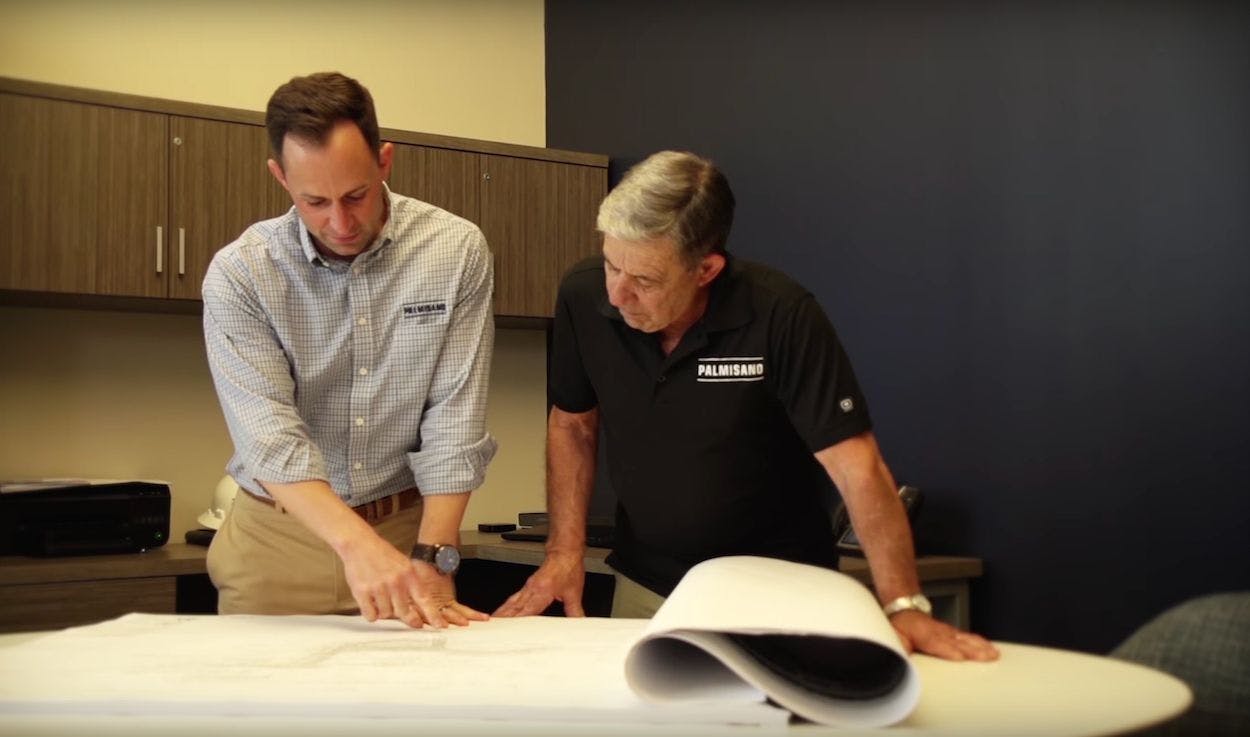
The Business Side of Family
Forging Community-wide Legacies, Generation by Generation
It’s usually pretty easy to get people talking about their families, especially those who are in business together. There are tales of being on the jobsite as a tyke, listening to advice from grandparents about the hardships they overcame and trying (often unsuccessfully) not to bring work home to the dinner table.
But one of the most striking things about family-owned businesses is that their roots extend far and wide through the community. For the companies that beat the succession odds—only about 12 percent make it past the second generation—their legacy is not all about the name of the founding family. It’s about embracing employees, contributing to the community and receiving support in return.
Without fail, earlier generations set the tone for the next in line to run with and build on. Following are four family-owned businesses doing just that.
Ninety-eight Years of Personalized Service
When a building materials company has been around for four generations, it’s bound to get a few offers to sell out to regional suppliers. For A. Gordon Heins III, president of A.G. Heins Company, Inc., Knoxville, Tenn., the answer has always been no. Everything about the business—from its location to its customer service—is personal.
Gordon’s grandfather, Albert G. Heins, Sr., established A.G. Heins Company, Inc. in 1920 at the age of 33, calling on customers on horseback. The warehouses still being used today were built from rail car dunnage, and those buildings stand on land that has belonged to the family since the 1860s. Albert stayed involved until 1983, seeing the company through the Great Depression and WWII.
“I challenged my pops to either get to 100 years old, or I would get the business to 100,” Gordon says. “He didn’t quite make it, living until 96 years old, so I have to get the business to 100.”
The lineage has always been strong, and continues to expand. Gordon’s father, Albert G. Heins, Jr., volunteered to serve in WWII at a young age, so Albert Sr. turned to a long-time employee named Ruth Love to keep the business afloat. During that time, the company furnished materials that went into building Oak Ridge National Laboratory, where the atomic bomb eventually was developed.
Post-war, Albert Jr. did sales and public relations for the business, formally becoming president and chairman of the board when his father died. Along the way, he introduced his son Gordon to the warehouse at age 13.
“We still received materials in boxcars then,” Gordon recalls. “We didn’t have forklifts, so we unloaded materials by hand.”
Despite the early indoctrination, Gordon had no ambition to join the family business. He got his architecture degree and worked for several design firms. But in 1981, the time came to choose between moving to Philadelphia to open an architectural firm for Boeing Engineering Construction or staying in Knoxville and joining A.G. Heins Company, Inc.
He stayed put, and quickly came to grips with the fact the University of Tennessee School of Architecture taught him very little about business. So at 27 years old, he started learning everything possible about how to buy, sell and manage inventory. Fortunately, for a period in the early 1980s, he had his grandfather, father and aunt to lean on for advice as active members of the company.
“I spent many years sitting with my grandfather on his front porch, talking about the turn of the 19th century and how it related to current events,” Gordon says. “When the 2008 recession hit, I always looked back and said if he could survive the Great Depression and pay back every penny he owed the banks, then we can survive this.”
When Gordon was a vice president in the 1980s, 80 percent of the business was roofing and 20 percent was commercial building products. But when single-ply EPDM roofing sprung up and suppliers decided to sell direct, A.G. Heins Company, Inc. had to adapt away from the roofing business and toward construction products. Gordon and Jon Williams, now executive vice president, spent the next decade acquiring product lines that could be sold to general contractors, subcontractors and do-it-yourselfers.
In 2004, Gordon’s oldest son Jacob joined the company as a salesman. Alex came on board three years later after earning a degree in construction engineering. And in 2012, their sister Anna was hired as an administrative employee. Today, Gordon is president and chairman, Jacob is in charge of sales staff in the Knoxville office, and Alex manages the company’s Blountville, Tenn., office. The company has 19 employees, down from 34 when the recession took hold.
“When I became president in 1991, my main focus was making sure every employee understood they’re part of my family,” Gordon says. “Each and every year the company profited, we made sure they shared in that profit.”
For a time, even Gordon’s wife was involved in the business. He hired her when all three kids were in college, with every penny earned during those six years going to their education. “When Alex graduated on Saturday, I fired my wife on Monday,” Gordon jokes. “But if you ask her, she retired on Monday.”
Looking ahead, Gordon predicts the transition from the third to fourth generation ownership will involve his three children coming together to decide on sectional responsibilities. But at age 64, Gordon doesn’t anticipate retiring anytime soon.
“I’m here to help manage what they’re doing and offer advice and historical data,” he says. “I understand the way my predecessors conducted business and how it doesn’t necessarily work today. If I can maintain that flexibility, I’ll continue to be successful.”
He has learned a hands-off approach is best for the millennial workforce; they’re incentivized by responsibility. “They operate on their own and have the freedom to buy and sell their own materials. I reward them for their productivity,” he says. “I have the hardest working millennials from 7 a.m. to 5 p.m. After that, their time is theirs. I’ve learned to accept that.”
With so much change occurring among concrete, masonry, roofing and stucco/plaster products, A.G. Heins Company, Inc.’s strategy is to stay on the leading edge (i.e., find a niche product, get to market early and make a reasonable profit). The company doesn’t try to compete with big box stores; it’s more about offering expertise and technical knowledge with a personal touch. The office layout hasn’t changed since 1925. When customers come to the counter, they can see every employee, including Gordon.
“This helps us develop relationships that have been maintained over the decades,” he says. “This will always be my grandfather’s business. I’m just passing it through.”
Do Good Work, Build a Better World
Following his return from WWII, Warren Palmisano Sr. channeled his strong work ethic and adventurous spirit into establishing W.J. Palmisano Contractors in New Orleans. He relied exclusively on word-of-mouth referrals for single-family home construction, building up operations for the next 30 years and setting a tone for the company that remains intact today.
“His unparalleled reputation for giving 110 percent until the job is done still drives our growth, and his common-sense approach steers our judgment,” says Wesley Palmisano, who has served as the third-generation president and CEO since 2013.
In the 1980s, Warren Sr. transferred leadership to his sons, Warren Jr. and Rodney, in a fifty-fifty partnership. Warren Jr., who still works as a contributing member of the team, started off as a full-time carpenter and developed a vast skill set managing day-to-day operations. And as Wesley’s father, he has been instrumental as a mentor.
“He has passed down the values of leadership, hard work, efficiency, responsibility, humility and frugality,” Wesley says. “His general outlook on life sets a wonderful example for the entire Palmisano team.”
While Wesley was eager to jump right in after finishing high school, Warren Jr. insisted he attend college. His son obliged, pursuing a construction management degree from Louisiana State University. But true to his waste-no-time personality, Wesley completed the four-year program in just three years and graduated first in his class.
He then spent the next decade working for a commercial contractor learning how to manage large-scale projects. In 2013, it was time for Palmisano to undergo another leadership transition, and Wesley followed his dream of taking over the family business.
Wesley’s determination to take the company to another level has resulted in the rapid transformation of a small residential builder into a large commercial and civil firm with annual revenue of $100 million—a 20,000 percent increase in just four years. In that time, the company also has completed more than 75 large-scale projects totaling approximately four million square feet, as well as hired more than 100 new employees.
“We have cultivated a work culture that fosters forward thinking, a commitment to excellence and a can-do attitude,” Wesley says. “The team consists of a highly engaged group of like-minded professionals who have the same goal in mind: Do good work for others.”
In addition to using efficient, sustainable processes to build lasting landmarks, such as a new hotel and conference center for the National World War II Museum, the firm strives to leave a positive impression on the community. Its mission is big and bold: “We have the honor, ability and responsibility to build a better world” for employees, clients, the construction industry and the community.
“None of us are here to simply get a paycheck,” Wesley says. “Palmisano’s charitable initiatives and community partnerships are the heart and soul of our work. They are what makes us excited to get up in the morning and why we go home feeling fulfilled.”
Being deeply embedded in communities is part of Palmisano’s DNA; of note, the company has built playgrounds for a women’s shelter and educational nonprofit organization, as well as helped re-establish the RECreate project in conjunction with the Young Leadership Council to serve youth through recreational activities on the weekends.
And the notion that place and space matter—that buildings drive the growth of cities and support the nation’s next thinkers and doers—stems back to Warren Sr.’s entrepreneurial nature.
“My grandfather would be extremely proud of the fact we have taken the Palmisano name to another level,” Wesley says. “Beyond revenue growth, the size and complexity of our projects has changed exponentially during the past four years, and he would be amazed at the innovation and technology advancements in the industry.
“We started as a family, and that original spirit of teamwork and togetherness continues to drive us.”
Maintaining the Modern Way
In 1975, Frank Bracco and his wife, Sherril, started Modern Plumbing Industries, Inc. (MPI) literally out of the trunk of their Chevy Nova. Though Frank was never afforded the opportunity for higher education, he knew hard work and a commitment to quality would yield success as a plumber in Orlando, Fla. With his two sons, Charles and Anthony, and a strong leadership team now at the helm of the firm—which boasts more than 140 employees in its contracting, service and repair divisions—Frank’s legacy is far exceeding his wildest expectations.
“Our dad always spoke his mind and told you how it was. In turn, you always knew where you stood with him," says Charles, president of MPI. “He could build a concept in his mind or see the prints in estimating once and know where a job should be months later. He was amazing at visualizing the finished product and understanding what it would take to accomplish it.”
Frank passed away in 2016, leaving behind memories that extend back to the boys sweeping floors, stocking shelves, digging ditches over the summer and going on company fishing trips.
“I remember the first time we got computers with a Microsoft operating system. No one knew how to use a mouse, so we let the team play solitaire on their computers to learn how to double click, click and drag, and drag and drop,” Charles recalls. Now, every foreman, superintendent and service technician has an iPhone and iPad, and BIM and total stations are used on many projects.
In 2004, Charles and Anthony committed to working at the family business, while their sister elected to attend law school. In 2012, with the impending “fiscal cliff,” they did some estate planning and decided it was better to figure out how to run the business without Frank while he was still alive. Frank “retired” in 2013 and was out of the office for an entire year, remaining just a phone call away to answer questions and provide guidance. After that transition period, Frank returned to help with budgeting, estimating and sales.
“In hindsight, it was a blessing that we transitioned in 2013, three years before he died unexpectedly. We didn’t know how little time he had left,” Charles says. “If we hadn’t done it then, the conversations with the bonding company and bankers would have been very different.”
One of the most significant legacies Frank imparted to his sons was the importance of apprenticeship. He was one of the founders of a local apprenticeship program, called PIPE, and taught plumbing after hours in the early years of his career.
“He always believed strongly in the trades and giving people an education so they could grow,” Charles says. He and Anthony are carrying out that commitment by staying involved in PIPE and the Central Florida Chapter of Associated Builders and Contractors. They als
o are in the process of establishing the Frank Bracco Memorial Scholarship within Seminole County Public Schools, and iBuild Central Florida created a grant for individuals in the industry in Frank’s name.
Family is the most important thing to the Braccos, and that includes a strong sense of obligation to every MPI team member and their families. The company takes care of its team by providing strong benefits, such as a 401(k) with safe harbor match, year-end bonuses, and company-paid medical, life and short-term disability insurance coverage.
“A company is only as good as the team of people it has. We’re very fortunate to have clients and team members who were loyal to our dad, and we didn’t take it for granted that they would stick with us,” Charles says. “Family members have to work within the same rules as the rest of the team—no coming in at 9 a.m. and leaving at 3 p.m. We lead by example and try to put the most qualified person in a position based on their knowledge, skills, experience and merit.”
That measured approach has served company operations well for the past 43 years as it has adapted to new HR, safety, legal and regulatory requirements, as well as responded to workforce demands. The business is also focusing on growing its service division in anticipation of the next economic downturn. Already, service work accounts for $4 million in annual business, with about 18 trucks on the road daily.
“Our grandpa instilled in our dad, and our dad instilled in us, that we are given two things: our name and our credit, and we’re not to mess either up. That’s why our word is our bond,” Anthony says. “We live and act based on ‘the Modern way’ with honesty and integrity. You can’t be everything to everybody, but you can always have pride in what you do.”
Fulfill Your Commitments
BARNES buildings & management group, inc., Weymouth, Mass., owes its 22 years of success to founder Marty Barnes’ vision of closing a gap in the metal building market. Having been in the industry since 1974, he recognized the handoff from the metal building manufacturer to the general contractor would consistently result in numerous “fumbles and lost yardage” due to improper installation and a disconnect among erectors, engineers and fabricators.
“I saw the need for a specialized service provider to give the general contractor professional design guidance on the front end and to follow up with a quality steel system erected in place with properly installed roof and wall products—all under a seamless, single source contract,” Barnes says.
Marty hasn’t done it alone. His wife Lynne is BARNES’ controller, leaving her career as a mortgage banker and senior vice president at a large lender in 2009 to direct all of the company’s finance, accounting and reporting activities, plus handle many human resources responsibilities. In Marty’s words, she does it all—from managing contracts and interpreting statistical information to appraising operating results that help guide the management team.
Their son Tony launched his career in 1996 at age 16 as an ironworker, welder and metal building assembler. He progressed to become a foreman, project manager, estimator and general manager of the firm’s steel fabrication facility, which opened in 2006 in Hanover, Mass. As of last year, Tony became vice president of operations overseeing all field personnel, scheduling and fabrication sales.
Tony’s sister Nina Pfister came on board as a part-time outsourced marketing consultant in 2015. She owns her own boutique advisory firm, driving all marketing and public relations efforts for the company.
Non-relatives also are an integral part of the business, which has about 40 employees. Lynne is assisted by Katie Vecchionne, who has been with the company for nearly a decade. And Tim Allison, who serves as vice president of project management, has been with BARNES since the early stages of the company before any family members were brought on board.
“Tim has been treated as an equal in all aspects of our leadership team since the beginning. He is the consummate professional with tremendous attention to detail and who always looks out for the customer’s benefit,” Marty says. “Also, with an eye on the future, five years ago we brought in Anthony Poliatti to assist Tim, and he is now an invaluable asset to our management team.
“I do my best not to offer special treatment to any individual simply because they hold our last name, and in fact I am probably tougher on family, as I expect more from those who are closest to me,” he adds.
“Tony started working hand-in-hand with our field personnel, so many of our existing staff have had the opportunity to build their own solid relationships with him as he embarked on his career journey to management.”
Tony looks back fondly on his teenage years working in the field as the company was just getting off the ground. And though his two older sons are just 7 and 10 years old, they often visit jobsites with their dad on Saturdays.
“I wouldn’t be surprised if at least one of them takes an interest in the business in some capacity given their exposure,” Tony says. “I just ask that they each leverage their own unique strengths to make a decent living.”
Both Marty and Tony face the challenge of respecting family time as a precious entity and not bringing office problems back home. On the flip side, they enjoy the accessibility and ease of communication that comes with working alongside one another.
One message that never gets lost in translation is the company’s mission to “do the job right.” Safety and quality are at the core of this statement, as is the promise to fulfill commitments.
“The word shortcut has never existing in our company or culture,” Marty says. “Our people take great pride in their work.”
That work has evolved during the past two decades as the perception of metal buildings has changed from “tin structures with insulation” to structures with almost unlimited design capabilities and excellent warranties. Specifically, foam-insulated panel systems for roofs and walls are now a major part of projects due to manufacturing improvements and new energy code requirements.
In conjunction, BARNES has grown to be able to perform multiple complex projects simultaneously, even outside its core New England market. Safety training, equipment and protocols have ramped up considerably as well.
According to Tony, “the training never stops” after a new hire comes on board to ensure personnel stay abreast of the latest safety standards and erection techniques.
“Our legacy will be our continuous effort to execute what we promise to our customers,” Marty says. “If we tell someone we’re going to get a job done, we do whatever it takes to make that happen. We enjoy the challenge.”
Joanna Masterson was a writer and editor for Construction Executive for more than a decade.
Related stories








